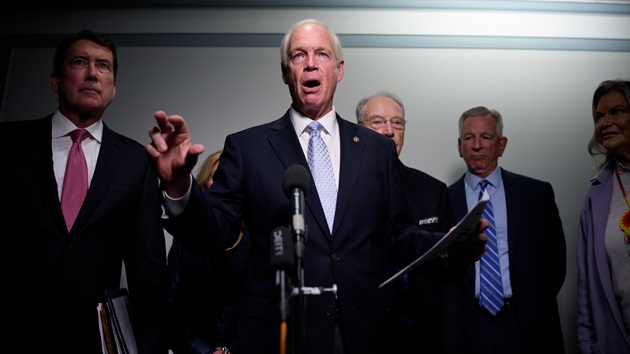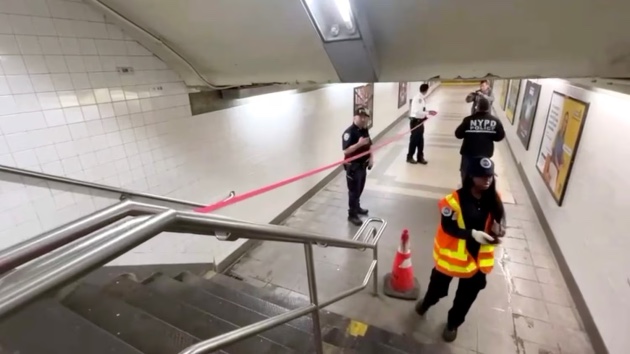George Floyd’s death offers lessons on how to stop cycle of police violence: AG
Written by ABC Audio ALL RIGHTS RESERVED on May 25, 2023

(NEW YORK) — Three years ago this week, George Floyd died while in police custody in Minneapolis after Officer Derek Chauvin kneeled on Floyd’s neck for more than 9 minutes.
Minnesota Attorney General Keith Ellison was the lead prosecutor in the case against Chauvin, who was convicted of murder and sentenced to 22 1/2 years in prison in 2021.
Ellison’s new book, “Break the Wheel Ending the Cycle of Police Violence,” explores the George Floyd case and offers insights for future cases of police brutality, aiming to foster justice, accountability and the end of the violent cycle within the criminal justice system.
Ellison spoke with ABC News Live Tuesday about the book and the anniversary.
ABC NEWS LIVE: So you transformed your personal diary entries from the Derek Chauvin trial into this book…documenting every step of the way. That had to change your perspective from the start of the trial to the end of the trial. What was your perspective like toward the end of the trial?
KEITH ELLISON: I was ready for it to be over. I can tell you that when we received the jury instructions and the jury was given the case and told to go to the jury room, we were sitting there on pins and needles.
And I had no idea what the outcome was going to be. In fact, I presumed that the odds were in Derek Chauvin’s favor.
ABC NEWS LIVE: Really? No inclination at any point thinking it was going to go in one way or another.
ELLISON: I did not know, but I thought if history was any judge and we looked at the first George Floyd state trial acquittals, Walter Scott hung jury. You had the Philando Castile case which happened in Minnesota acquittals. And when the jury, when the judge read the verdict, guilty, guilty, guilty on all counts, I was surprised, but I wasn’t necessarily joyful about it.
I was relieved that it was over, and I was relieved that the jury saw what we were trying to tell them, which is that this was a criminal act and they needed to say so. That’s what a verdict is, the truth.
ABC NEWS LIVE: Do you think the landscape of the Derek Chauvin trial changed other police brutality cases or will change them in the future?
ELLISON: I think the answer to that is yes, and I’ll tell you why. If you look at this tragedy involving Tyre Nichols in Memphis, I’m impressed by how the police chief got out there, [and] released the video fairly quickly. The county attorney gave people confidence that there was going to be real accountability in this matter.
I think we’ve turned the corner in terms of how we handle these things, but I must say, we have not turned the corner in terms of police deaths. We have not reduced the number of in-custody shootings or officer-involved-of deadly force encounters. And so we still have a lot of ways to go before we break the will.
ABC NEWS LIVE: Well, let’s talk about the potential conflict of interest between prosecutors and police. You write in the book, “It’s hard to prosecute police for a number of reasons. But one of the more notable is that police and prosecutors enjoy a close professional relationship, which prosecutors often use to protect their police officer allies.” So what steps do you believe need to be taken to address that potential conflict of interest?
ELLISON: Well, one thing we have to do is just remind prosecutors you are to pursue justice and truth without fear or favor of anyone. If you feel you can’t do that, move the case to another county, [or] send the case to the attorney general’s office. But if you have any relationship issues which make you have to back off pursuing justice, you should transfer that case out of your office.
ABC NEWS LIVE: You mentioned police deaths, still people dying at the hands of police. According to the website Mapping Police Violence, police have killed at least 363 people so far this year. How can law enforcement officers be held more accountable for acts of violence that do possibly cross the line?
ELLISON: Let me say, those 363, maybe some of those shootings or deaths are within the law. Police officers are allowed to use force, including deadly force, if their lives are threatened or if the lives of others are threatened. So I don’t want to say all of those are bad. But I would say that it’s very unlikely that, really, too many of those, more than maybe 2%, will ever be held accountable because of just the way we do it.
ABC NEWS LIVE: What do you do in that situation if you are that young officer that is looking up to someone like Derek Chauvin, who’s in charge and is doing the wrong thing. What do you do in that situation?
ELLISON: What we say now is you better do something because you have a duty to intervene. If you’re seeing your officers doing something that you can plainly see is against policy, you may be held accountable yourself if you don’t do something.
What if they just said, “You know what? He’s subdued,” and stood up. Now, you might not be popular back at the station, but maybe George Floyd would be alive right now.
Copyright © 2023, ABC Audio. All rights reserved.
 KVSP
KVSP 




